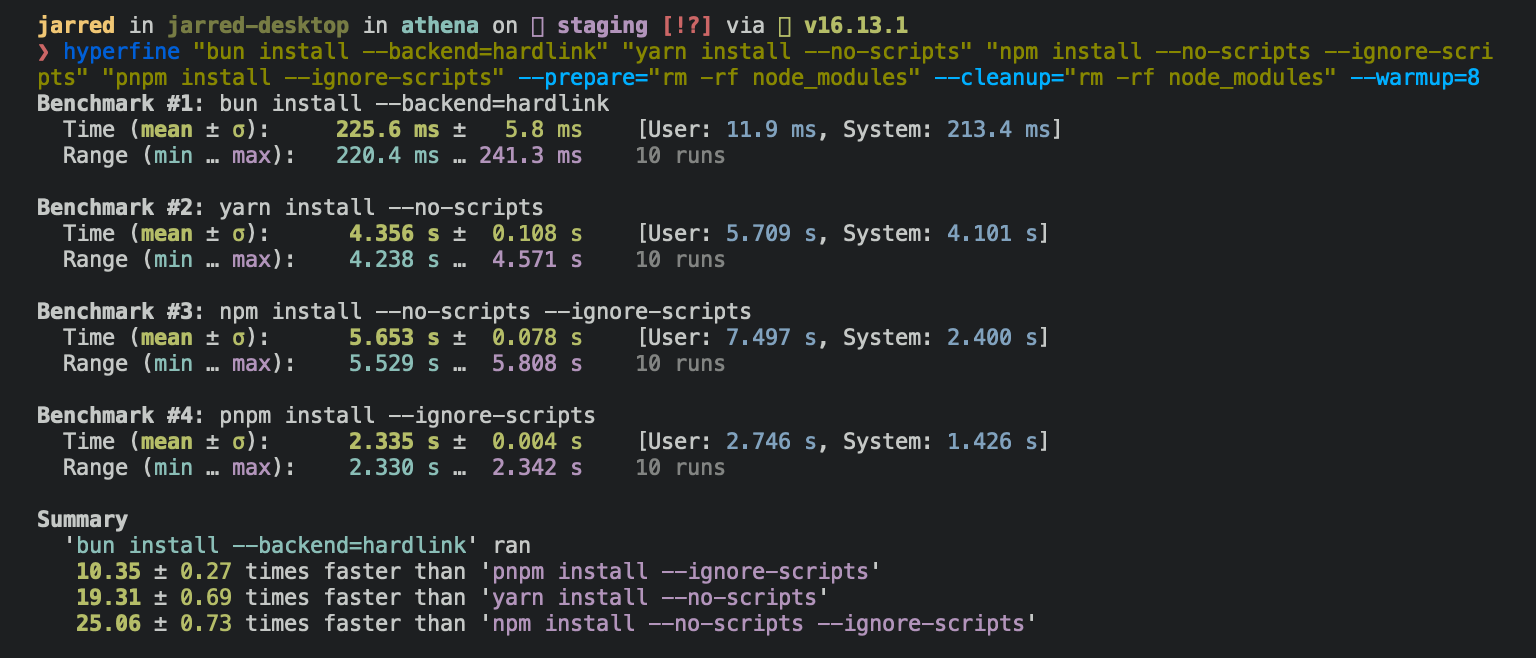bun-types
Version:
Type definitions and documentation for Bun, an incredibly fast JavaScript runtime
225 lines (155 loc) • 5.51 kB
Markdown
The `bun` CLI contains an `npm`-compatible package manager designed to be a faster replacement for existing package management tools like `npm`, `yarn`, and `pnpm`. It's designed for Node.js compatibility; use it in any Bun or Node.js project.
{% callout %}
**⚡️ 80x faster** — Switch from `npm install` to `bun install` in any Node.js project to make your installations up to 80x faster.
{% image src="https://user-images.githubusercontent.com/709451/147004342-571b6123-17a9-49a2-8bfd-dcfc5204047e.png" height="200" /%}
{% /callout %}
{% details summary="For Linux users" %}
The minimum Linux Kernel version is 5.1. If you're on Linux kernel 5.1 - 5.5, `bun install` should still work, but HTTP requests will be slow due to a lack of support for io_uring's `connect()` operation.
If you're using Ubuntu 20.04, here's how to install a [newer kernel](https://wiki.ubuntu.com/Kernel/LTSEnablementStack):
```bash
# If this returns a version >= 5.6, you don't need to do anything
uname -r
# Install the official Ubuntu hardware enablement kernel
sudo apt install --install-recommends linux-generic-hwe-20.04
```
{% /details %}
## Manage dependencies
### `bun install`
To install all dependencies of a project:
```bash
$ bun install
```
On Linux, `bun install` tends to install packages 20-100x faster than `npm install`. On macOS, it's more like 4-80x.

Running `bun install` will:
- **Install** all `dependencies`, `devDependencies`, and `optionalDependencies`. Bun will install `peerDependencies` by default.
- **Run** your project's `{pre|post}install` scripts at the appropriate time. For security reasons Bun _does not execute_ lifecycle scripts of installed dependencies.
- **Write** a `bun.lock` lockfile to the project root.
To install in production mode (i.e. without `devDependencies`):
```bash
$ bun install --production
```
To install dependencies without allowing changes to lockfile (useful on CI):
```bash
$ bun install --frozen-lockfile
```
To exclude dependency types from installing, use `--omit` with `dev`, `optional`, or `peer`:
```bash
# Disable devDependencies and optionalDependencies
$ bun install --omit=dev --omit=optional
```
To perform a dry run (i.e. don't actually install anything or update the lockfile):
```bash
$ bun install --dry-run
```
To generate a lockfile without install packages:
```bash
$ bun install --lockfile-only
```
To modify logging verbosity:
```bash
$ bun install --verbose # debug logging
$ bun install --silent # no logging
```
{% details summary="Configuring behavior" %}
The default behavior of `bun install` can be configured in `bunfig.toml`:
```toml
[install]
# whether to install optionalDependencies
optional = true
# whether to install devDependencies
dev = true
# whether to install peerDependencies
peer = true
# equivalent to `--production` flag
production = false
# equivalent to `--save-text-lockfile` flag
saveTextLockfile = false
# equivalent to `--frozen-lockfile` flag
frozenLockfile = false
# equivalent to `--dry-run` flag
dryRun = false
# equivalent to `--concurrent-scripts` flag
concurrentScripts = 16 # (cpu count or GOMAXPROCS) x2
```
{% /details %}
### `bun add`
To add a particular package:
```bash
$ bun add preact
```
To specify a version, version range, or tag:
```bash
$ bun add zod@3.20.0
$ bun add zod@^3.0.0
$ bun add zod@latest
```
To add a package as a dev dependency (`"devDependencies"`):
```bash
$ bun add --dev @types/react
$ bun add -d @types/react
```
To add a package as an optional dependency (`"optionalDependencies"`):
```bash
$ bun add --optional lodash
```
To add a package as a peer dependency (`"peerDependencies"`):
```bash
$ bun add --peer @types/bun
```
To install a package globally:
```bash
$ bun add --global cowsay # or `bun add -g cowsay`
$ cowsay "Bun!"
______
< Bun! >
------
\ ^__^
\ (oo)\_______
(__)\ )\/\
||----w |
|| ||
```
{% details summary="Configuring global installation behavior" %}
```toml
[install]
# where `bun install --global` installs packages
globalDir = "~/.bun/install/global"
# where globally-installed package bins are linked
globalBinDir = "~/.bun/bin"
```
{% /details %}
To view a complete list of options for a given command:
```bash
$ bun add --help
```
### `bun remove`
To remove a dependency:
```bash
$ bun remove preact
```
## Git dependencies
To add a dependency from a git repository:
```bash
$ bun install git@github.com:moment/moment.git
```
Bun supports a variety of protocols, including [`github`](https://docs.npmjs.com/cli/v9/configuring-npm/package-json#github-urls), [`git`](https://docs.npmjs.com/cli/v9/configuring-npm/package-json#git-urls-as-dependencies), `git+ssh`, `git+https`, and many more.
```json
{
"dependencies": {
"dayjs": "git+https://github.com/iamkun/dayjs.git",
"lodash": "git+ssh://github.com/lodash/lodash.git#4.17.21",
"moment": "git@github.com:moment/moment.git",
"zod": "github:colinhacks/zod"
}
}
```
## Tarball dependencies
A package name can correspond to a publicly hosted `.tgz` file. During `bun install`, Bun will download and install the package from the specified tarball URL, rather than from the package registry.
```json#package.json
{
"dependencies": {
"zod": "https://registry.npmjs.org/zod/-/zod-3.21.4.tgz"
}
}
```